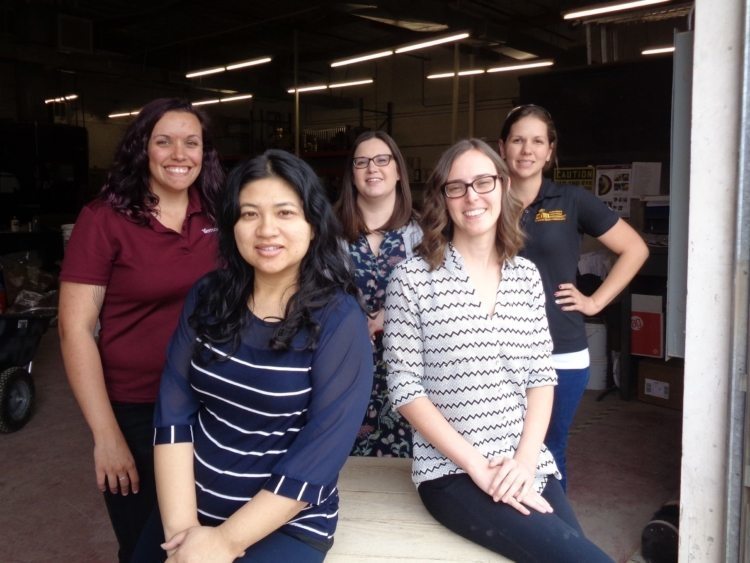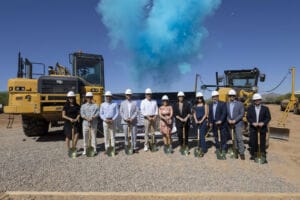Each year during National Engineers Week, the National Society of Professional Engineers designates an “Introduce a Girl to Engineering Day.” And for good reason.
While 20 percent of engineering school graduates are women, they make up just 11 percent of practicing engineers, according to the Society of Women Engineers (SWE). It also reports that one in four female engineers leave the field after age 30, compared to just one in 10 male engineers.
In a 2013 report, the STEM (Science, Technology, Engineering Math) Business Group wrote: “We must challenge the stereotyping and bias that can still pervade our culture, particularly within the male-dominated engineering and technology sectors. Attracting and retaining a more diverse workforce will maximize innovation, creativity and competitiveness.”
With high schools and universities collaborating to encourage more female students to pursue a career in STEM fields, it is imperative that the engineering community to do its part as well.
Terracon, an employee-owned consulting engineering firm that provides environmental, facilities, geotechnical and materials services, is an industry leader in diversity and inclusiveness. Based in Olathe, Kansas, the company’s Tempe office employs five female engineers, each bringing an expertise to its many service lines.
“There are no stereotypes when it comes to engineers in this office; we are extremely proud that our most-valued professionals are both female and male,” says Terracon Office Manager Brent Borchers. “We would have had six female engineers, but one had a baby and her family was her priority – as it should be. That’s the culture that we embrace here.
“Our niche of the A&E (architecture and engineering) industry has been male dominated. It’s wonderful to have such a talented group of women be a significant part of our local staff and contribute so much to our success,” Borchers adds.
Terracon’s women engineers:
>> Jennifer Tran, PE (Professional Engineer), MBA, Senior Project Manager, Geotechnical Services
>> Laura Spencer, Ph.D., PE, Group Manager, Geotechnical Services
>> Brittany Dalton, Staff Professional, Geotechnical Services
>> Kendra Clouse, Dispatcher, Tech Level 3; Materials Services
>> Marissa Raleigh, Assistant Project Manager; Materials Services
Studies and explanations of women leaving the industry early include a lack of mentorship in the field and the demands of maintaining a balance between work and family life.
With the National Society of Professional Engineers honoring its own this week, Terracon’s women engineers discuss their mentors, the satisfaction they get from their job, and how they see the expanding role of women in engineering.
Jennifer Tran, PE, MBA
It’s no surprise Tran pursued a career as an engineer. When she was in first grade, her father, a teacher in their native country of Vietnam, would scribble up to six algebra problems on a chalk board in the family’s living room. It was up to her and her siblings to solve the problems.
“He was my motivating factor,” says Tran, who has been at Terracon for 12 years. “He would go over the problems with us until we got them right. Math was always his thing. He had a passion for it and urged us to understand math early in life.”
“I always wanted to be an engineer but, at one point in my life, I considered going into dentistry. After I fainted on the job, that’s when I knew dentistry is not for me and back to engineering it is,” she says with a laugh.
In her role as senior project manager, Tran works on multiple national accounts related to pavement for Lowe’s, Walmart and The Home Depot. Locally, she oversees one of Terracon’s longest running accounts – more than 16 million square feet of asphalt pavement for Maricopa Community Colleges.
Tran graduated from the University of California-San Diego with a degree in structural engineering and later pursued an MBA. She said exposure to STEM courses at an early age is important because technology in those fields changes so fast.
“It gives kids a perspective (about engineering),” Tran says. “It did me. It made me curious as to what was around me. It was important to see the ever-changing world; seeing how things are built or created.
“I hope I can be a good role model and mentor to younger engineers as I had a great mentor in my career,” she says. “I see interns at pavement conferences and try to encourage them pursue their dreams of being an engineer if that’s the route they want to go.”
The satisfaction she gets from being an engineer?
“I think it has to be that I did a job well done,” Tran says. “I also like to see a final result. My original plan was computer or electrical engineering, but I soon realized that it was not for me. You can’t see a tangible end result. I prefer something I am able to see and can be proud of. That’s my self-motivation.”
Laura Spencer, Ph.D., PE
Upon graduating from Carnegie Mellon University in Pittsburgh with a Bachelor of Science degree in civil engineering, Spencer headed South to Georgia Tech and earned a Master of Science and Ph.D. in civil engineering with a concentration in geotechnical engineering. She has served as Terracon’s Geo Design Group Manager the past four years.
Drive down the Grand Avenue portion of US 60 through the West Valley and chances are you will see an abutment wall from her team. Spencer has also overseen projects in other states, including a massive park in Tulsa, Oklahoma.
“When I was in high school I was pretty good in science and math,” she recalls. “At Carnegie Mellon I was taking classes across different disciplines. I took some intro to engineering classes, and really liked civil. It was either structural engineering or construction management, but I wanted to do something different than everyone else.”
“I wanted to be challenged by something different at every site; soil that is different; something that’s going to be constantly changing; solving problems,” Spencer says.
Of course, she had a great mentor in her father: a nuclear engineer.
“I never thought that engineering was not an opportunity for me,” Spencer says. “I was always involved with science competitions and science fairs. In college there were more women than men in my classes. It’s great now to have STEM outreach (for young women), but engineering is a challenging environment.”
“The one thing that drives me is wanting to be the best at anything I do. I have a Ph.D. I have completed two Ironman competitions. I treat my job that way, too. I want to be the best damn geo design engineer there is. I have two kids and a husband. Sometimes you can’t be the best at everything and there is a breaking point. I just keep trying,” she adds.
“I’m lucky to have a great mentor in Don Clark (PE) in my office. Having a mentor at work really helps stretch my technical knowledge and how to apply it. He makes you find the solution; he doesn’t just give it to you,” she explains. “And he is teaching me through example how to mentor the younger engineers.”
Spencer’s greatest satisfaction?
“That I’ve solved the problem; I’ve figured it out,” she says. “And then how cool it is to see what you just built.”
Brittany Dalton
When Dalton joined Terracon after graduating from Arizona State University almost six years ago, she pretty much knew geotechnical engineering was her calling. She is a staff geotechnical engineer and E.I.T. (engineer in training).
Her expertise is designing various types of retaining wall systems including mechanically stabilized earth (MSE) retaining walls, gravity retaining walls and various types of temporary shoring.
A memorable project?
“I designed a soil nail wall at the airport in Telluride, Colorado, with Don Clark,” she recalls. “It was very large, about 40-feet tall and almost 500-feet long. The client didn’t want it to be an eyesore to the neighboring community, so we came up the idea of using a vegetated face by with hanging baskets filled with seeded topsoil to the wall.”
Dalton says her father motivated her to pursue an engineering career. He introduced her to civil engineering – and she was hooked.
“Math and science were my strong suits in high school,” she says. “In high school everyone took chemistry over physics. Our physics teacher had to come into one of my classes to convince kids to take physics because no one really knew what it was.”
“After that I decided to take his class because it sounded kind of cool. I ended up taking Physics II as well because I liked it so much. That helped me with my Statics and Dynamics classes in my civil engineering major because I already had an understanding of the material,” she adds.
Dalton says she isn’t surprised by the SWE data, and added being an engineer is a full-time occupation that wouldn’t bode well for the part-time option.
“In consulting, you’re always working and you have to make the client happy,” she says. “You work early, and you work late. You have the knowledge of the project you’re working on so you really can’t ask someone else, ‘can you take over for me?’ Usually projects aren’t that easy for someone else to jump into the middle of.”
“Don Clark has been my mentor during my professional career at Terracon,” Dalton says. “He has taught me basically everything I know about retaining wall design. Whenever I have a difficult project I will go to him for guidance. He has taught me to think outside of the box.”
Her greatest satisfaction?
“It’s cool to know when I design something, it will be built,” she says. “You can actually see your work.”
Kendra Clouse
Clouse is the “newbie,” having joined the Terracon team just two months ago. She graduated from ASU’s Fulton School of Engineering with a degree in construction management with a concentration in concrete industry management. This is a rare specialty that gives her in depth knowledge of concrete materials and mix designs.
Prior to joining Terracon, Clouse spent seven years working for two national manufacturers of building materials and products, five years as a field technician, and two years as an assistant plant manager.
She says her love for this industry is derived from “problem solving and working hard to find a solution and applying it.”
Clouse’s greatest satisfaction?
She says, “I love driving around town and pointing out to my children the projects that I have contributed to, just as my father did with me as a child.”
She strives to share her love of engineering and construction with the next generation, just as her father shared his with her.
Limiting factors for women in engineering? Clouse is a single mother with two children and says there are other women in the field with similar circumstances.
“The fact is, we work odd shifts,” she explains. “We work until the job is completed, which is really a 9 to 5. Sometimes it’s a struggle trying to be the best mom you can be, and work the hours that are required to be successful.”
She explains how finding reliable daycare that will work around this unpredictable schedule is a challenge.
In her early years, she says it was a struggle to be a “student, mom, and have a full-time job.”
Marissa Raleigh
Raleigh plays an interesting role: she works full time for the City of Phoenix as a Terracon employee. An assistant project manager, she oversees materials (concrete field inspection) on canal projects and federal work.
She has been with Terracon for almost three years and earned a civil engineering degree from ASU. Her motivating factor:
“I really liked math and science in high school,” Raleigh recalls. “I picked a degree that went in that direction. I had a boyfriend at that time in construction. He suggested I consider materials testing. Soil and concrete; that’s where it’s at.”
She also credits a mentor that encouraged her to pursue more engineering-related opportunities to further her career.
“It was more along the lines ‘why are you testing the soil and what do the tests show you?,’” she says.
Raleigh confesses the type of work she performs may not be for everybody. It requires a lot of heaving lifting at the job sites. Her job description is all about soil and asphalt. Her concern over women leaving the industry echo what studies show: balancing work and family.
“I would love stay home with my child, but today you can’t live on just one paycheck,” Raleigh says. “I know there are employment options like job sharing, but you can’t do that in this industry. It doesn’t make financial sense.”
From what does she derive her job satisfaction?
“My goal is to make things better and more efficient,” the Tucson native says. “There is always room for that. There is always something you can change and make better. There is always something else.”
Founded by the National Society of Professional Engineers in 1951, National Engineers Week, or EWeek, is dedicated to ensuring a diverse and well-educated future engineering workforce by increasing understanding of and interest in engineering and technology careers. Each year, EWeek reaches thousands of schools, businesses, and community groups across the United States. This year, National Engineers Week will be Feb. 18-24.




